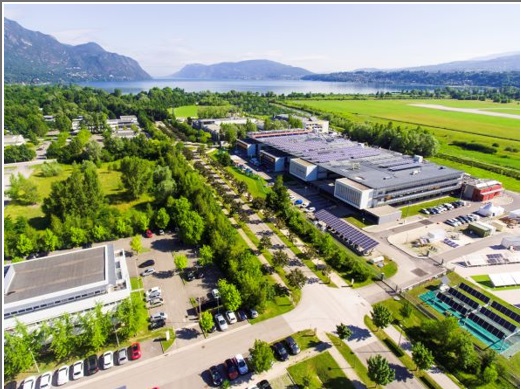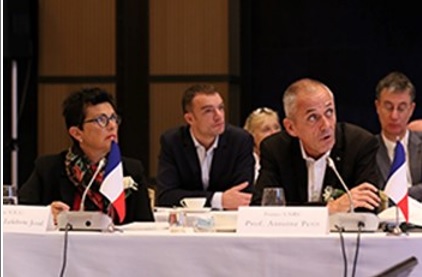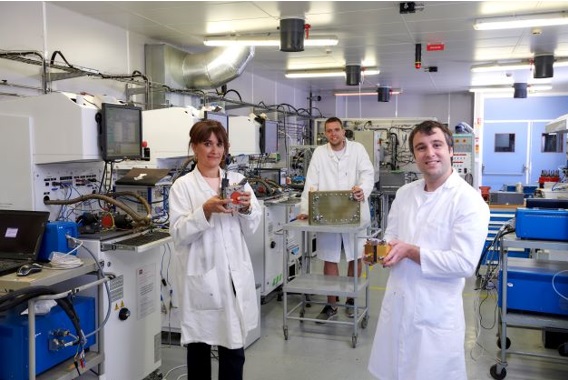-
About
-
Outcomes
-
Conference
-
Events

Dr. Florence Lefebvre-Joud, CEA-Liten
CEA (Alternative Energies and Atomic Energy Commission) is one of France’s national technological research centers. It participated in RD20 (Research and Development for Clean Energy Technologies) which started in 2019, and pursues energy innovation for decarbonation of society. CEA is mandated by French government to achieve research and innovation supporting the energy transition and the digital transition. . CEA-Liten is an institute localized in Grenoble Area that focused on renewable energy. We asked Dr. Florence Lefebvre-Joud (Photo 1), who is Research Director at CEA-Liten in charge of international partnerships, about the institute’s approach for RD20.


The renewable energy technologies studied by CEA-Liten (Photo 2) such as solar cells, solar panels, smart grids, electric vehicles, fuel cells, and bioenergy, seek to reduce CO2 emissions and achieve a circular economy. CEA-Liten conducts life cycle assessments in order to achieve this goal, and is also working on eco-design, recycling, and additive manufacturing (3D printing) to increase the efficiency of material consumption. The institute demonstrates renewable energy technologies and transfers them to industry.
Dr. Lefebvre-Joud has been an acting science director at RD20 since 2019, and France has been working with Japan’s National Institute of Advanced Industrial Science and Technology (AIST). She says that CEA-Liten decided to get involved in RD20 together with AIST following AIST’s request for cooperation after the G20 since CEA-Liten is focused on renewable energy, and since RD20’s goal of a low-carbon society is aligned with the approach of CEA-Liten.
Dr. Lefebvre-Joud delivered a presentation on behalf of France in 2019 and became a member of the Advisory Board since she was CEA-Liten’s contact point researcher with AIST, the organizer of RD20.

At the RD20 held in 2019, Dr. Lefebvre-Joud came to Tokyo and gave a short lecture on CEA-Liten’s activities, what she wanted to do at the conference, how to take initiative, and how to approach international collaboration. In 2020 and 2021, meetings were held remotely due to coronavirus. In the technical session, two lectures with technical content were held by CEA. In one of the technical lectures, co-author Dr. Julie Mougin discussed the production of hydrogen using solid oxide electrolysis at high temperatures, and in 2021 Dr. Laurent Antoni described policies to promote hydrogen in a low-carbon society. Dr. Antoni runs European initiatives and described the setting of standards to solve problems.
Dr. Lefebvre-Joud said that she hopes the event will be held in Tokyo in 2022 and that people from all over the world will come together to discuss the issues, and she would especially like to hold a workshop in the technical session. As the topic for the workshop, she would like to propose lifecycle analysis of hydrogen. For example, she would like to create a task force to determine common metrics for hydrogen environmental footprint as an energy source and to share them for common use by any country and for government requirements.
If there are requests for other topics, she would also like to consider these, but she would first like to define and establish a common evaluation method for measuring the properties of hydrogen. In addition, she says that lifecycle analysis of CO2 is also important, and a series of lifecycle-related themes such as the collection, use, and storage of CO2 may emerge. The main point is to select topics of common interest for all countries participating in RD20 and define the gaps, needs, and synergies, etc. The goal is to be able to collaborate based on the participation of various countries. CEA-Liten has been giving lectures on hydrogen research over the past two years and found that various countries are interested in hydrogen, so this year, it is thinking about developing a common method for evaluating the impact of hydrogen energy.
If a common evaluation method can be developed, since the environmental benefits are already known, it will be possible to clarify the problems of using hydrogen as an energy source. This work will require international cooperation, and Dr. Lefebvre-Joud says that CEA-Liten has been discussing the topic with Michio Kondo of the AIST Global Zero Emission Research Center. It is a good theme for G20 countries to discuss at the same table.

Although there is not much discussion of economics in relation to hydrogen energy, Dr. Lefebvre-Joud points out that, in her own personal view, one of the biggest problem with hydrogen energy is economics. There is always a problem of cost when creating a new industrial infrastructure Compared to coal, oil, and gas, hydrogen energy is still expensive. Dr. Lefebvre-Joud says that on a technological point of view it is necessary to improve the durability and reliability of hydrogen energy systems and also, for allowing its penetration in our societies, it is mandatory to involve economists and sociologists.
If there are requests for other topics, she would also like to consider these, but she would first like to define and establish a common evaluation method for measuring the properties of hydrogen. In addition, she says that lifecycle analysis of CO2 is also important, and a series of lifecycle-related themes such as the collection, use, and storage of CO2 may emerge. The main point is to select topics of common interest for all countries participating in RD20 and define the gaps, needs, and synergies, etc. The goal is to be able to collaborate based on the participation of various countries. CEA-Liten has been giving lectures on hydrogen research over the past two years and found that various countries are interested in hydrogen, so this year, it is thinking about developing a common method for evaluating the impact of hydrogen energy. If a common evaluation method can be developed, since the environmental benefits are already known, it will be possible to clarify the problems of using hydrogen as an energy source. This work will require international cooperation, and Dr. Lefebvre-Joud says that CEA-Liten has been discussing the topic with Michio Kondo of the AIST Global Zero Emission Research Center. It is a good theme for G20 countries to discuss at the same table.
If the production of hydrogen causes a large amount of CO2 emissions, then hydrogen energy is meaningless. The balance with energy sources such as solar, nuclear, and wind is important.
Dr. Lefebvre-Joud says that CEA-Liten has created a joint venture with industry for commercializing the high-temperature solid oxide electrolysis technology, and is currently transferring this technology. She also mentioned fuel cells using a polymer based technology, which are also being transferred to industry, and fuel cell vehicles using this technology circulating in France.
France is working on hydrogen energy, and the first market that is targeted is industrial uses. For this market, the ambition is to develop around 700 MW electrolysis capacity by 2023 for producing low carbon hydrogen.
The next goal after industrial uses is transport with vehicle fleets. The priority is large commercial vehicles such as buses and trucks, and large vehicles such as trains. For large commercial vehicles, hydrogen filling stations can be set up for each local fleet. . There is a plan to install 100 hydrogen stations across France by 2023. The plan is to grow to 850 locations by 2028.
With regard to passenger cars, since the average daily distance traveled in France is around 15 km, electric vehicles are suitable, and fuel cells will be fitted to vehicles that travel longer distances.These fuel cell vehicles are expected to come later..
Energy storage for grid balancing is expected to become the third market. Considering storage, several solutions are being considered, some already mature other still at the research stage. One interesting path currently studied at CEA-liten is the storage of Hydrogen in the form of organic liquids or of ammonia (NH3)..
Dr. Lefebvre-Joud concluded considering that in the future, energy will not be created and used in individual countries, but optimal solutions will be found based on international cooperation.
Kenji Tsuda Editor in Chief, Semiconductor Portal